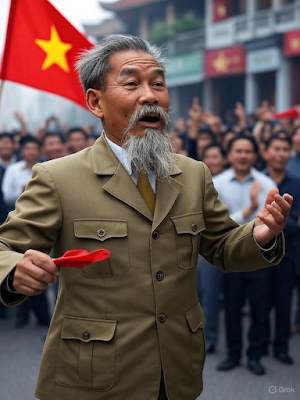Ho Chi Minh: The Unyielding Spirit Behind Vietnam’s Fight for Freedom
Hanoi, Vietnam –
As the United States deepens its involvement in Vietnam, committing nearly half a million troops to a war that defies easy victory, the figure of Ho Chi Minh looms large. Known to his people as “Uncle Ho,” the 76-year-old leader of North Vietnam embodies a relentless quest for independence that has shaped his nation’s history for decades. To Americans, he is a communist threat; to the Vietnamese, he is the voice of liberation from centuries of foreign rule.
A Vision Born in Exile
Ho Chi Minh, born Nguyen Sinh Cung in 1890, began his journey in 1911 when he fled French-controlled Vietnam, vowing to free his homeland. By 1919, at the Versailles Peace Conference, a young Ho, dressed in a borrowed suit, dared to demand independence for Vietnam. His plea was ignored by world leaders, but it marked the start of his transformation into a global advocate for Vietnamese freedom. “There is nothing more precious than independence and freedom,” Ho is credited with saying—a belief that has driven his life’s work.
Adopting communism in the 1920s after finding inspiration in Lenin’s anti-colonial writings, Ho traveled the world, rallying support for Vietnam’s cause. His fiery speeches, printed in newspapers, denounced French oppression: “We have been tortured pitilessly… forced to live in utter ignorance.” Eluding French authorities with disguises and pseudonyms like “Nguyen the Patriot,” Ho became a symbol of resistance, though his radicalism drew both praise and enmity.
The Rise of Uncle Ho
By 1941, Ho returned to Vietnam, taking the name Ho Chi Minh—“he who enlightens.” From a remote cave hideout in Pac Bo, he founded the Vietminh, a guerrilla force that united peasants—93% of Vietnam’s population—in a fight against Japanese occupation. His folksy charm earned him the nickname “Uncle Ho,” resonating deeply with a people yearning for change. In 1945, with U.S. support against Japan, Ho’s Vietminh expelled the occupiers. On September 2, 1945, in Hanoi, he declared Vietnam’s independence, quoting America’s own Declaration of Independence: “All men are created equal.”
But the world’s shifting politics soon turned against him. As the Cold War dawned, Ho’s communism made him a target. The U.S., fearing the “domino theory” of spreading communism, backed France’s bid to reclaim Vietnam. In 1946, the Vietminh’s attack on French forces at Haiphong ignited the First Indochina War. Ho’s resolve never wavered. “I will lose ten men for every one you lose,” he told a French official, “but in the end, I’ll win.”
A War Without End
The Vietminh’s stunning victory at Dien Bien Phu in 1954 forced France’s retreat, cementing Ho’s status as a nationalist hero. Yet, at the Geneva Conference, Vietnam was divided at the 17th parallel, leaving Ho with only North Vietnam. Bitter but pragmatic, he focused on building a communist society, redistributing land to peasants. However, his land reforms turned violent, with thousands executed, tarnishing his image among some.
Now, in 1966, as U.S. troops flood South Vietnam, Ho’s Viet Cong guerrillas intensify their fight to unify the country under communism. American policymakers, convinced they can succeed where France failed, aim to “wear down” the enemy. Yet, Ho’s forces, fueled by hope for a better future, remain undeterred. “A revolution is fought by people who are hopeful,” one historian notes, capturing the spirit driving Vietnam’s resistance.
A Complex Legacy
Ho Chi Minh’s monastic lifestyle and charismatic leadership inspire fierce loyalty, but his communist ideology and ruthless tactics draw criticism. To some, he is a liberator; to others, a divisive figure responsible for a bitter, decades-long struggle. As the Vietnam War escalates, with no clear victory in sight, Ho’s dream of a free, united Vietnam remains both a rallying cry and a source of global contention.
For the Vietnamese, the cost has been immense—millions have suffered or died. For Americans, the question lingers: Why are we fighting in this distant land? As one observer put it, “Vietnam was unwinnable for the French, and it’s unwinnable for us.” Only time will tell if Ho Chi Minh’s vision will triumph or if the war’s toll will redefine his legacy.











